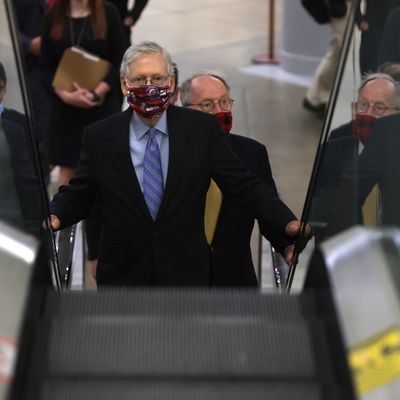
Last week, House leadership suspended its monthlong recess, with Majority Leader Steny Hoyer vowing to keep the legislative body open for as long as it takes to pass a second coronavirus stimulus bill through Congress. After stalling on the negotiations all summer, this week, Senate Republicans facing shaky election prospects at home are also lobbying Majority Leader Mitch McConnell to delay their vacation scheduled to start on Friday.
Maine senator Susan Collins, who is trailing by four points in polling averages, is very troubled by the Senate’s failure thus far to agree to a COVID-19 relief bill to replace the expiring CARES Act. “If we can’t get this done in the midst of a persistent pandemic then we have failed the American people,” Collins told Politico. In a comment to the same outlet, Texas senator John Cornyn said that the coming stimulus package will be a “looming factor” in the November election. Though Cornyn enjoys a solid lead over challenger M.J. Hegar, the Democratic Party is planning a seven-figure investment in the race in the hopes that competitive presidential polling in Texas could trickle down the ballot.
With the clock quickly running down, the two parties were at a significant impasse at the beginning of the day, as CNBC reports: “Neither side had budged on plans for extending extra federal unemployment insurance or offering relief to budget-crunched state and local governments, among other topics. Negotiators have failed to crack the impasse even after the $600-per-week jobless benefit and a moratorium on evictions from federally backed housing expired.” The divide is made more challenging by the internal split within the GOP: While senators in close races like Arizona’s Martha McSally support a weeklong extension to the $600 unemployment benefit running out on Friday, the libertarian from Kentucky, Rand Paul, told Politico he did not want to send the message to voters that “Republicans are acting like Democrats.” (Paul’s comment does not take into account the polling, which shows a majority of swing-state voters supporting the extension of CARES Act unemployment benefits, including the $600 weekly check and the $1,200 universal income payment.)
As New York’s Eric Levitz notes, the pandemic and its economic crisis have “pitted the GOP’s ideological commitments against its electoral interests.” But vulnerable Republican senators are hoping that second part may change with the forthcoming HEALS Act: In addition to the likely inclusion of a second round of $1,200 payments to most Americans, Mitch McConnell said on Tuesday that he could support an extension to the $600 weekly federal unemployment benefits that Democrats and President Trump both support.






























